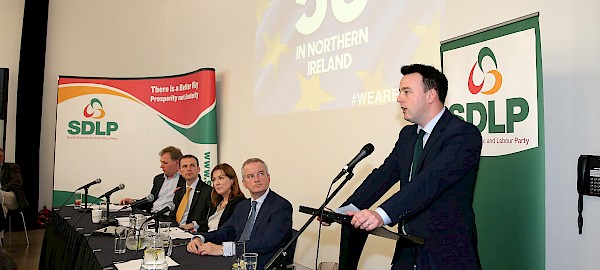
SDLP leader Colum Eastwood speaking at an SDLP event on aftermath of EU referendum
“THE prospect of Northern Ireland being forced out of the European Union against its wishes is an insult to the democratic mandate of those living here and would cause great injury to future economic prospects.”
That was the message this morning Foyle MLA Colum Eastwood at an SDLP event which featured Dankse Bank economist Angela McGowan, Stephen Gethins MP from the SNP, John McGrane from the British Irish Chamber of Commerce and David Phinnemore, Professor of European Politics.
Speaking at the event held in The MAC in Belfast, SDLP leader Colum Eastwood said, “The 56% who voted to remain part of the European Union in the North are looking for leadership and direction. The SDLP is determined to give voice to that constituency of people.
“The current political limbo in London must not deter us from immediately exploring every avenue which protects the interests of this island.
‘I have spoken to President of the European Parliament Martin Schultz and today I will be holding meetings with Micheal Martin and Brendan Howlin in Dublin. A collective effort is needed if we are to protect our collective interests. We must all work together to protect this island’s place in Europe.
“It is disappointing that the First Minister is not prepared to accept and act upon the democratic decision of people in the North.
“However, that must not deter us. Arlene Foster does not have a veto on what engagement should happen across the island. Intensive North-South engagement is now a necessity.
“The first Minister is also ill advised in warning the Irish government not to represent Northern interests in the forthcoming negotiations.
“The uncomfortable truth our First Minister must eventually face is that the 56% who voted remain welcome any intervention which is designed to protect the economic and social benefits flowing from EU membership.
“Many of those people come from the unionist community. The Irish Government has a positive duty to represent all Northern citizens in the coming negotiations.”
The speakers discussed the impact that a potential exit of the European Union would have on NI’s domestic economy and also on UK/Irish trade.
Stephen Gethins MP from the SNP detailed the case being made in Scotland with Prof David Phinnemore discussing the constitutional position and possible legal pathways ahead.
Stephen Gethins MP said, “On 23 June Scotland and Northern Ireland voted to remain part of the European Union.
“I am pleased that our friends, family and closest of neighbours in Northern Ireland rejected calls to turn our back on cooperation with our European partners.
“People gain through EU membership in a wide variety of ways. I recognise that people in England and Wales voted differently.
“I am disappointed by that but respect their decision however the same consideration must be given to the views expressed in Scotland and Northern Ireland.
“Any new settlement must reflect the political reality. Scotland and Northern Ireland must be fully represented in all and any negotiations and consulted before the Article 50 is lodged.
“Leadership will be critical in this process and since we are seeing precious little from Westminster devolved administrations have a crucial role.”
John McGrane, Director General of the British Irish Chamber of Commerce, said, “In the aftermath of the UK vote to Leave the EU, the British Irish Chamber of Commerce will be the leading voice for British and Irish businesses, calling for the retention of a free trading environment between Ireland, Northern Ireland, Scotland, Wales and England.
“The Chamber is proactively and constructively supporting the governments in Ireland, Northern Ireland and the rest of the UK, as well as representatives of the EU, to bring about a Trade Protocol which optimises free movement of people, goods, services and capital in a borderless fashion.
“The Chamber is dedicated to supporting businesses in Britain, Ireland and Northern Ireland, who must now plan for a changed environment.”
Angela McGowan, Danske Bank Chief Economist, said, “Clearly the economic environment that businesses in Northern Ireland face is rapidly changing. There is heightened uncertainty around a number of areas including future access to markets, taxation, investment and even cross border trade.
“It is important to note that UK policy makers have openly recognised the important role that both monetary and fiscal stimulus will play in the months ahead; essentially all economic levers will be used to support the economy and in our view that is the correct approach.”
Professor David Phinnemore, School of Politics, International Studies and Philosophy at Queen’s University Belfast, said, “Negotiating a new relationship with the EU is going to be an extremely difficult task. The EU is a tough negotiator, will stick to a balance of rights and obligations, and will not entertain cherry-picking.”





